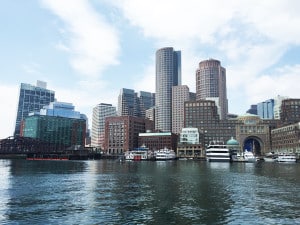The members of the real estate industry found themselves on opposite sides of a conversation on Beacon Hill Tuesday about how to come up with enough money to help Massachusetts communities prepare for climate change.
Two bills, from Gov. Charlie Baker and House Speaker Bob DeLeo, received hearings before different committees Tuesday. Baker’s bill would raise the state’s real estate transfer tax to generate as much as $137 million a year to help cities and towns prepare for and adjust to climate change, while DeLeo’s bill would borrow the money.
Representatives of the Massachusetts Association of Realtors and the Greater Boston Real Estate Board testified in support of DeLeo’s bill, while the head of the Massachusetts Association of Community Development Corporations spoke in favor of doubling the taxes in Baker’s bill.
The contrasting approaches to the same problem will create a choice for legislators over the coming months, but on Tuesday it was welcome friction for environmental advocates who relished the focus on climate issues.
“Massachusetts is poised to become an example for the rest of the nation by crafting a truly bipartisan approach to combating the climate crisis, and boy, do we ever need a bold, bipartisan example of something here, and why not the most important issue facing humankind?” Keith Bergman, retired Littleton town administrator and former president of the Metropolitan Area Planning Council, said at the hearing on the House bill.
Baker’s plan is to generate new revenue to help cities and towns address their climate vulnerabilities by raising the state’s deeds excise from $2.28 to $3.42 for every $500 of the price of a property sale. The money would go into a Global Warming Solutions Trust Fund created last year as part of a $2.4 billion bond bill, and augment the work already being done through the Municipal Vulnerability Preparedness program. A trust fund would let private money be combined with tax money, Baker said, while borrowed money would come with limitations on how it could be spent.
DeLeo’s bill, filed by Telecommunications, Utilities and Energy Committee House Chair Thomas Golden, would create the GreenWorks infrastructure program and allocate $1 billion over 10 years. Communities could apply for grants through the Executive Office of Energy and Environmental Affairs to fund installation of solar grids, electric vehicle charging stations, resiliency infrastructure and more.
Environmental Affairs Secretary Kathleen Theoharides told legislators the state has 370 miles of seawall along the coast, 25,000 culverts and small bridges that are aging, and 3,000 dams, of which 300 are considered “high hazard” and will require $15 million to $20 million in repairs over the next four years. So far, 249 of the state’s 351 cities and towns have started the vulnerability planning process through the MVP program. Baker said some are already pursuing projects, like Pittsfield, where the city is replacing a “high-priority culvert” that causes flooding.
A coalition of environmental and community groups urged the Revenue Committee to consider doubling Baker’s real estate transfer tax and split the funding between climate change preparedness and affordable housing.
“Our bold new coalition reflects the broad consensus throughout the Commonwealth that we need to take immediate, comprehensive, and significant action to address both our housing crisis and climate crisis,” said Joe Kriesberg, president of the Massachusetts Association of Community Development Corporations.
Greg Vasil of the Greater Boston Real Estate Board and Jonathan Schreiber of the Massachusetts Association of Realtors testified together on DeLeo’s plan, which Schreiber said “provides the best avenue to fund and operate climate resiliency programs in the commonwealth.”
“Everyone will feel the negative effects of climate change, therefore everyone should contribute to remedying the problem,” Schreiber said. “Contrary to Senate Bill 10, paying for this ubiquitous problem should not rest solely on the backs of home buyers and sellers.”
Dave Sweeney, chief of staff to Boston Mayor Marty Walsh, said one challenge facing many municipalities is how to make “equitable decisions” on climate resiliency without “driving up the cost of housing,” and urged the committee to report out the House bill “favorably and expeditiously.”




 |
| 


